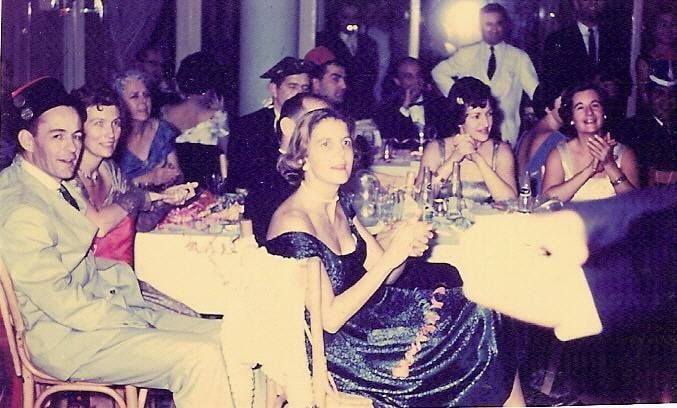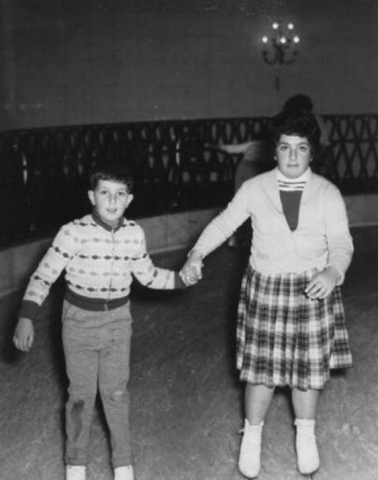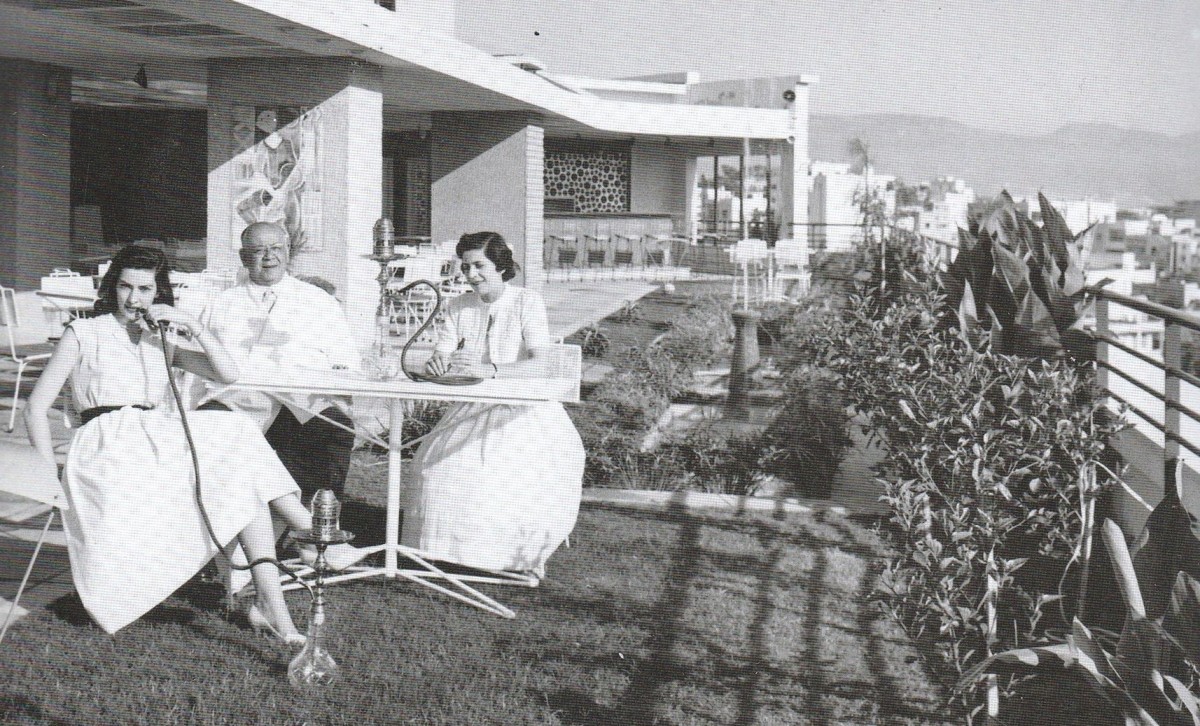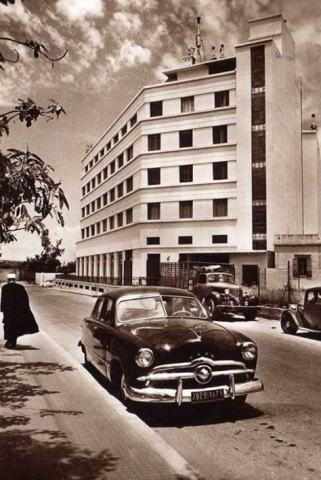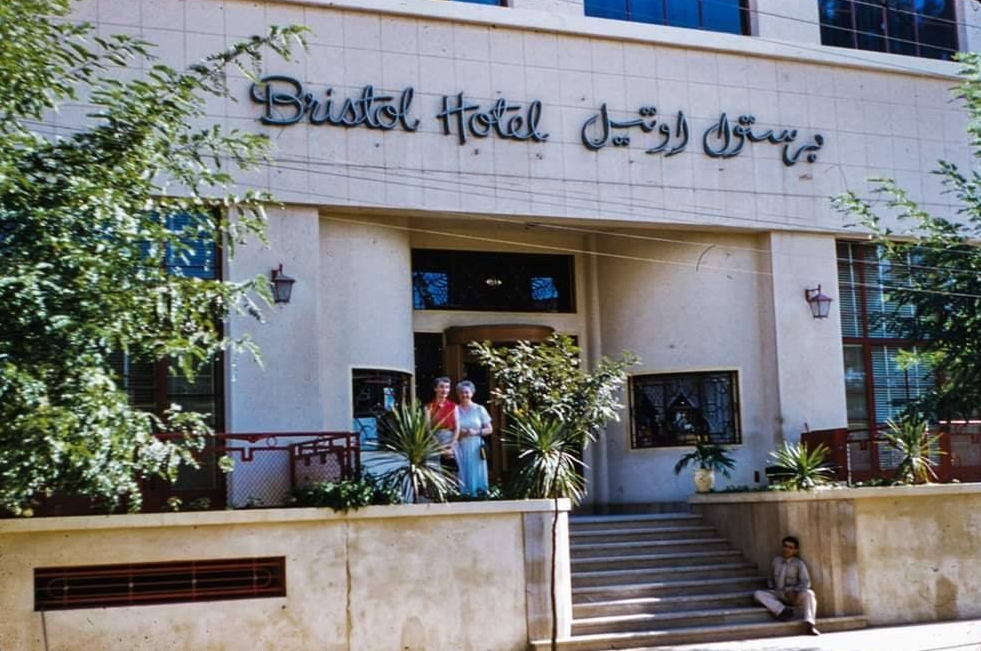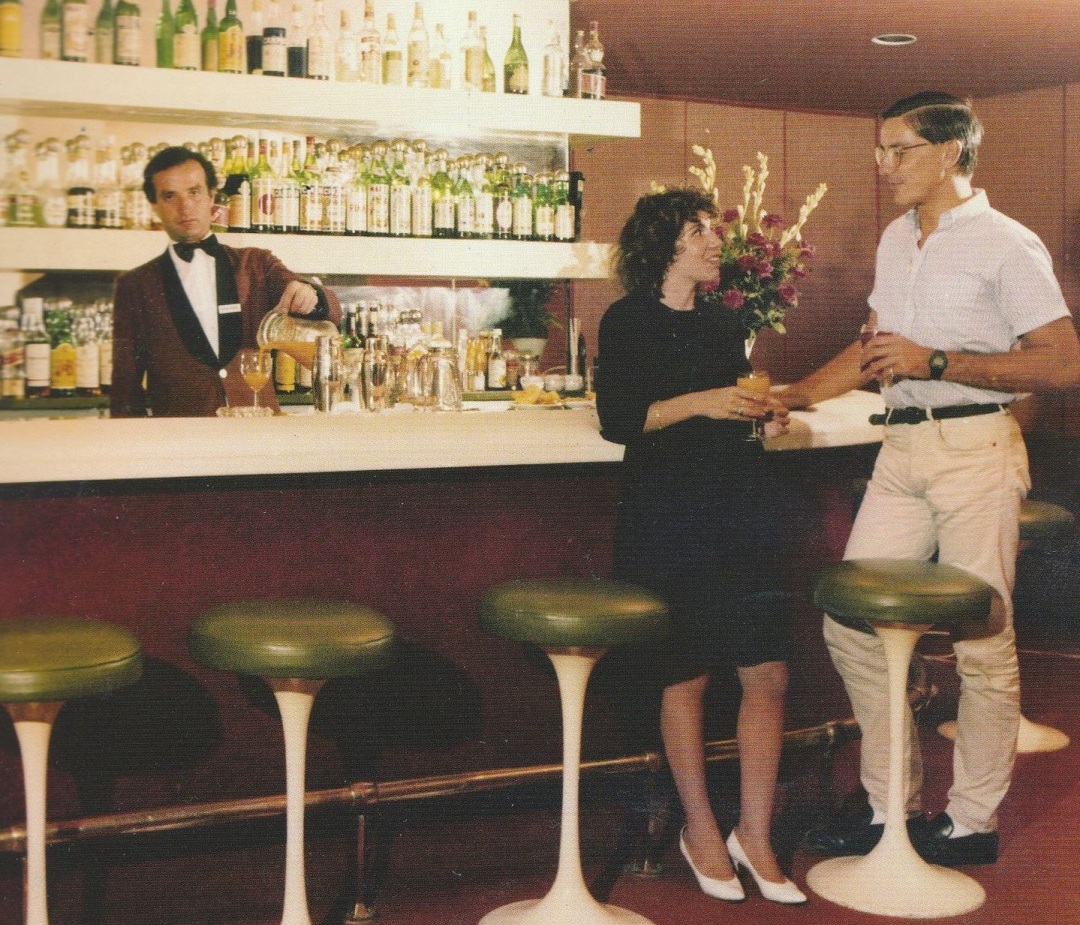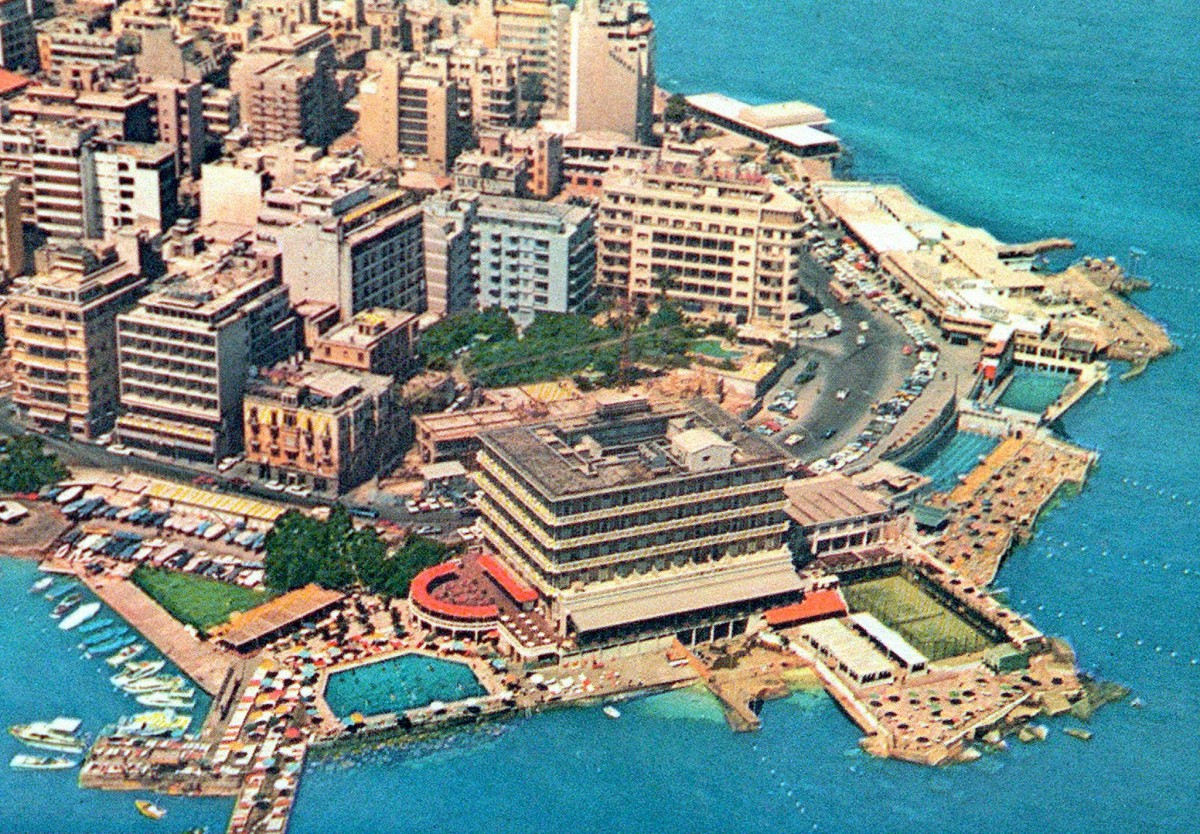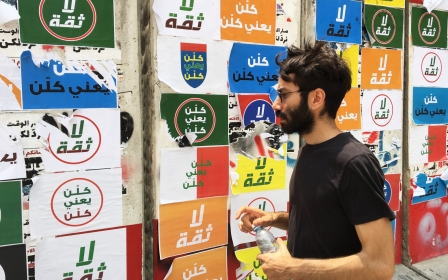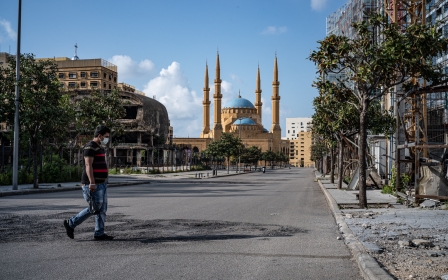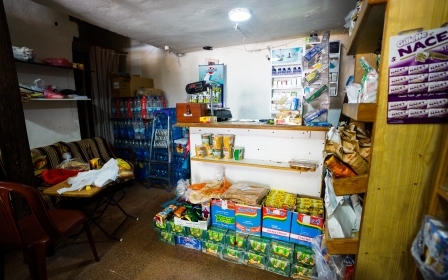The rise and fall of Le Bristol Hotel, a beacon of Lebanon's Golden Era
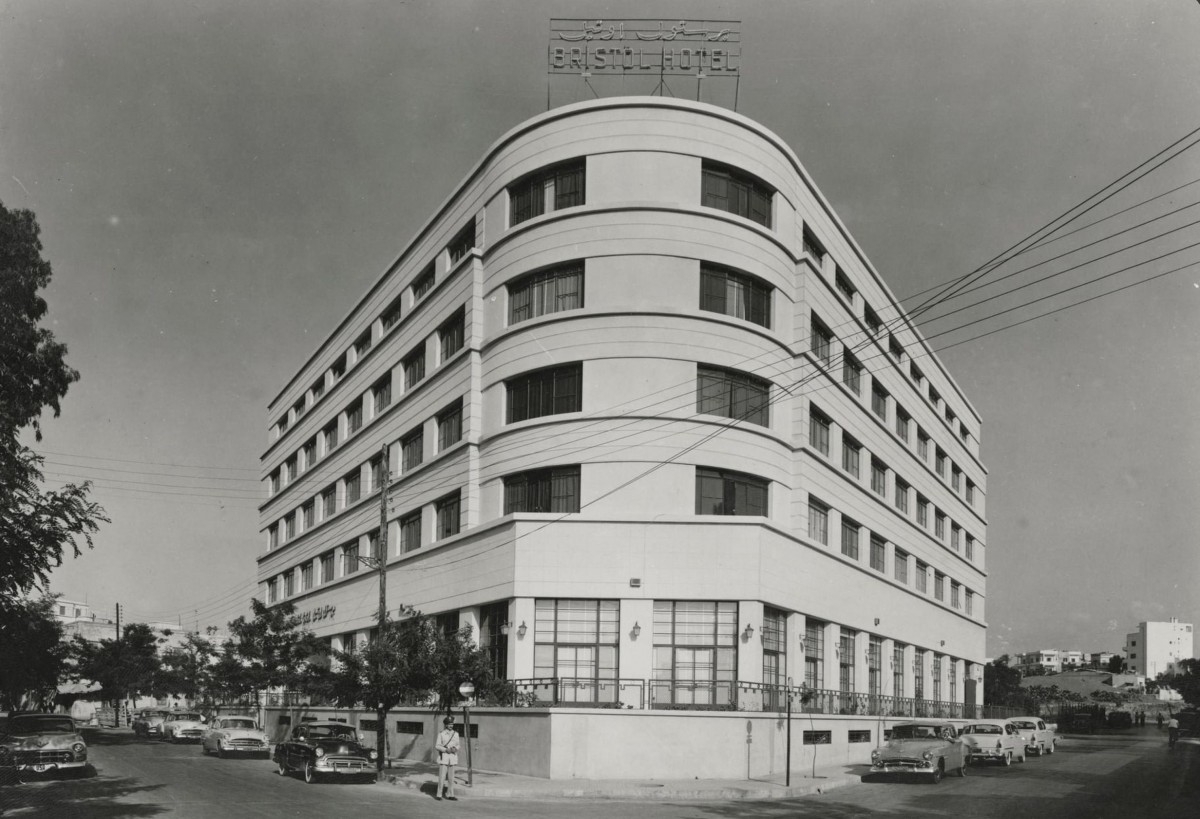
Set on the corner at the intersection of the upscale residential Verdun neighbourhood, Beirut's prestigious Le Bristol hotel was inaugurated in 1951. For over half a century its glamorous ballroom hosted weddings, ceremonies and political gatherings of the country’s high society.
From the late shah of Iran Mohammad Reza Pahlavi, and his wife Soraya Esfandiary-Bakhtiari, to Prince Albert of Monaco and former French president Jacques Chirac, its guest list read like a who’s who from the political archives.
Conserved in its “golden book” are the signatures of other influential figures, including American aviator Charles Lindbergh, and Nizar Qabbani, a regular guest and one of the Arab world’s most beloved poets.
Stepping into its colourful, modernist lobby, the handiwork of renowned French interior designer Jean Royere, known for his sophisticated yet whimsical style, your eyes would immediately sweep to his sought-after 1940s Ours polairs (polar bear) armchairs and sofas, which rapper Kanye West once called “my favourite piece of furniture”.
New MEE newsletter: Jerusalem Dispatch
Sign up to get the latest insights and analysis on Israel-Palestine, alongside Turkey Unpacked and other MEE newsletters
Surrounded by many of these little reminders of its tapestried history, one could almost conjure up American jazz legend Dizzy Gillespie, who stayed at Le Bristol in 1956 during what the New York Times called his “swing through the Middle East”.
Gillespie is said to have regularly regaled guests with his terrific tales, since he was not only a trumpet virtuoso but also a born raconteur (Whitney Balliett of The New Yorker once said that “No-one talks like Gillespie”).
But after the hotel shut its doors earlier this year, it’s only the stories that are left behind. When Le Bristol’s management announced on 15 March that the hotel would have to close because it was going bankrupt, the news was met with shock.
The compounding economic hardships that triggered the popular uprising in Lebanon last October had frightened off many tourists and led to few winter reservations.
But with the onset of the global pandemic and the subsequent lockdown measures to maintain the spread of the coronavirus, including the closure of the Rafic al-Hariri airport, the country consequently experienced the worst economic crisis since the civil war, delivering the final blow to the tourism industry in the country.
People soon were sharing tributes of their personal memories of the hotel in its heyday.
While some people lauded the widely feted haute cuisine, specifically its Parisian-style pastries, others recalled particular features of the hotel they had cherished growing up.
One of these features even became a rite of passage for many youngsters: its small circular ice-skating rink, which opened in the late 1950s, was Lebanon’s first.
“When I was in my early teens, I used to ride my bicycle to the Bristol, park it outside, and rent the skates,” 75-year old retired administrator Khalid Saidi told Middle East Eye.
“At that age, being teenagers, we were looking for nice girls. This was one of the main reasons to go there at that time - the boys were coming to see the girls to hang out, talk, and get telephone numbers, and vice versa.”
Aside from the opportunities for co-mingling, the hotel had other ways of attracting young people spurred by a different kind of lust.
“We used to go up to the balcony and listen to this Italian guy who used to sing Italian songs with an orchestra and have a ‘chocolat mou’[fluffy chocolate mousse with whipped cream],” says Saidi.
“We could only do this once a week because this was our pocket money.”
He would eventually outgrow the hotel in his late teens as it became a more popular dining location for older people, although he did go back for a few weddings since it remained a popular venue.
It was a sense of belonging that kept bringing people back, says Nazira El-Atrache, a former general manager at the hotel.
“Le Bristol was a place where both the youth and adults met, as it has something to offer everyone,” says Atrache, whose wedding as well as her four sisters’ was held at the hotel.
“The Lebanese crowd gathered here for family time and for fun.”
The closest thing to the 'outside world'
Although Le Bristol forms part of Beirut’s collective memory, like most luxury hotels it was not accessible to the average Lebanese, though it still played a part in their aspirational dreams.
“All these hotels, just like private universities, like the American University of Beirut, were symbolic of the dream of emigrating abroad,” Fouad Kanaan, a 62-year-old interpreter, told MEE. “It was the closest thing we had to the outside world.”
Growing up in the working-class neighbourhood of Tariq el-Jdideh in West Beirut, Kanaan could only dream of staying in one of the hotel’s rooms, which, he says, cost more per night than he would make in an entire month.
“We regular Lebanese wanted to be part of Lebanon’s elite, live like they did. Get a taste of the world outside of Lebanon.”
In the early 1970s, Kanaan says, when he was in his early teens, he would swim for two hours from the public Ramlet al Bayda beach on the southern end of the Corniche promenade to the prestigious St Georges Hotel.
From its sea-lined deck he could peek out from the cold water during the dreamy golden hour at the rich, famous, and foreign guests lounging and chatting as they sipped on cocktails and champagne.
For him and his friends, these hotels were a pathway to the western world. “I would watch how they would speak to each other and how they dressed, intrigued by their glamorous lives.”
Watching these people’s lives unfold inspired him to teach himself English, by listening to the radio and translating songs by Jim Croce, Cat Stevens, Marvin Gaye and Kool and the Gang.
But many of these nostalgic locations, along with everyone’s dreams, would slowly but steadily be destroyed during the country’s devastating civil war, which broke out a few years later.
During the war, most of the country’s administrative apparatuses, including the army, splintered into various sectarian components.
With the increasing interference of external actors and the seemingly never-ending power struggles within the various sectarian communities, the civil war, which led to around 100,000 deaths and over a million displaced people, raged on for 15 years.
During which Beirut went from being dubbed the “Paris of the Middle East” to a synonym of mindless death and destruction.
'The Bristol Declaration'
As a testament to its resilience, Le Bristol managed to stay open during the civil war, mostly due to its then-director, Ana Arakelian. She was so famed for her tenacity and no-nonsense approach that she became known as “the iron Armenian woman”, and was even decorated with a medal for her efforts, as noted in Le Monde in 1982.
“One day she decided that, war or no war [...] whether under shelling or not, Le Bristol would remain as it should be," the French daily wrote.
The hotel even became a refuge for people displaced from their homes - albeit an expensive option reserved for the limited population who could afford it - including some of Saidi’s friends.
“In the evening, we would sit on the stairs leading up to the hotel entrance and have a drink while listening to the news on a radio we brought with us,” he says.
'Foreign correspondents preferred to stay at Le Bristol, as it was known as one of the best utility hotels, very discreet and in a quiet area'
- Martin Short, British journalist
One of the main reasons the hotel managed to stay afloat during the civil war was its ability to provide basic but crucial amenities, such as electricity - especially during the scorching summer days.
It had a bar which served liquor, a popular resort to dull their senses and keep spirits alive after horrifically long days of terror and trauma.
During this time, Le Bristol was also known as the go-to hotel for foreign correspondents covering the region.
Martin Short, a prominent British journalist, recalls his first assignment in Beirut for UK’s ITV channel in 1969.
“It was after the ‘67 war and we were all afraid that it would go off again,” Short told Middle East Eye.
“While the St Georges hotel was known for its exclusivity, intrigue and professional spies, foreign correspondents preferred to stay at Le Bristol, as it was known as one of the best utility hotels, very discreet and in a quiet area.”
Years later, in the late autumn of 2004, Le Bristol became the backdrop to an eponymous declaration.
By then, Syrian hegemony over Lebanon had led to heightened internal criticism and increased external pressure. This spurred a multi-confessional coalition of Lebanese opposition groups to issue a joint public statement known as “The Bristol Declaration,” following meetings in the hotel.
The statement denounced the unconstitutional extension of then-President Emile Lahoud’s mandate and called for an end to corrupt politics and the right to Lebanese self-determination.
The assassination of former Prime Minister Hariri shortly thereafter, on Valentine’s Day 2005 triggered a series of unprecedented peaceful civil resistance demonstrations. These culminated on 14 March when an estimated one million Lebanese flooded central Beirut in what became known as The Cedar Revolution, to demand Freedom, Sovereignty, and Independence).
Following the demonstrations, Syrian troops withdrew from Lebanon on 27 April 2005.
The Battle of the Hotels
Beirut hotels have often told the story of the city.
The terrace overlooking the Mediterranean Sea of the iconic Saint Georges hotel is a symbol of an era in which Lebanon was the playground of the international jet set’s crème de la crème - from Hollywood power couple Elizabeth Taylor and Richard Burton to Arabic music’s most beloved diva Oum Kalthoum; while Brigitte Bardot and Omar Sharif would stay at the nearby Phoenicia hotel.
Not far from the peeling pink façade of the four-storey St Georges hotel, built in the late 1920s by Parisian architect Auguste Perre and gutted by fire and looters in 1975 at the start of the civil war, stands a 26-story ruined skyscraper, riddled with shots of firearms and artillery.
The Holiday Inn was only open for a year, between 1974 and the beginning of the war in 1975, before becoming a coveted target of militants and armed groups caught in sectarian conflict.
These three hotels all became pawns in the so-called Battle of the Hotels, a sub-battle in the early years of the civil war during which rival militias fought each other for control of Beirut’s most luxurious playgrounds for the rich, turning them into sniper havens and rocket turrets instead.
The nearby Commodore Hotel in Hamra was also home to dozens of foreign journalists during those terrifyingly tumultuous years.
While Le Bristol may have weathered a 15-year-long civil war, the Cedar Revolution, and the 2006 Israeli War on Lebanon, it wasn’t able to withstand the economic crisis wrought by decades of corruption by the political elite.
“At first, when the war broke out, everyone thought that in a matter of a few years we could at least continue dreaming of a better life, whether in Lebanon or abroad,” Kanaan says.
“Back then these places [luxury hotels and locations] gave us hope. Now they have become a symbol of everything that’s wrong with this country. They magnify the economic disparity.”
In this sense, the tragic fate of Le Bristol has come to symbolise that of the beleaguered country as a whole.
“The Bristol is a place where history is present. It has always been a landmark expressing confidence linked to the continuity and trust people have in Lebanon. We used to say: as long as The Bristol is here, Lebanon continues to exist,” Atrache says.
So what does it mean for Lebanon now that Le Bristol, or rather, that which it represented for so long, is gone?
Pierre Doumet, its former CEO and a member of the wealthy Lebanese family who has owned the hotel since its inception, says that the current business climate in Lebanon is no longer suitable for family businesses like his. “In a severe economic crisis such as the one Lebanon is, unfortunately, witnessing now, investors have more pressing priorities.”
But he stresses that he still holds hope for his hotel and Lebanon as a whole. “Yes, winds of change are blowing and adaptation is key to survival. But hope is the last thing that dies.”
Even after its closure Le Bristol is poised to remain a cultural landmark, one that rallies a community around its shared memories. It serves as a reminder of a Lebanon both at its zenith and in its darkest chapters, the repercussions of which are still felt to this day.
Middle East Eye delivers independent and unrivalled coverage and analysis of the Middle East, North Africa and beyond. To learn more about republishing this content and the associated fees, please fill out this form. More about MEE can be found here.


